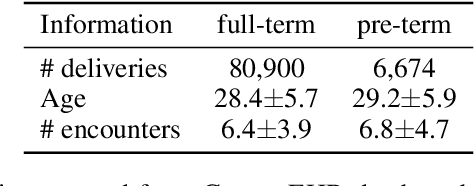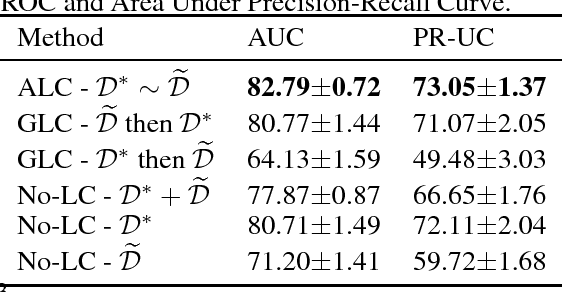Haithum Elhadi
Federated Uncertainty-Aware Learning for Distributed Hospital EHR Data
Oct 27, 2019


Abstract:Recent works have shown that applying Machine Learning to Electronic Health Records (EHR) can strongly accelerate precision medicine. This requires developing models based on diverse EHR sources. Federated Learning (FL) has enabled predictive modeling using distributed training which lifted the need of sharing data and compromising privacy. Since models are distributed in FL, it is attractive to devise ensembles of Deep Neural Networks that also assess model uncertainty. We propose a new FL model called Federated Uncertainty-Aware Learning Algorithm (FUALA) that improves on Federated Averaging (FedAvg) in the context of EHR. FUALA embeds uncertainty information in two ways: It reduces the contribution of models with high uncertainty in the aggregated model. It also introduces model ensembling at prediction time by keeping the last layers of each hospital from the final round. In FUALA, the Federator (central node) sends at each round the average model to all hospitals as well as a randomly assigned hospital model update to estimate its generalization on that hospital own data. Each hospital sends back its model update as well a generalization estimation of the assigned model. At prediction time, the model outputs C predictions for each sample where C is the number of hospital models. The experimental analysis conducted on a cohort of 87K deliveries for the task of preterm-birth prediction showed that the proposed approach outperforms FedAvg when evaluated on out-of-distribution data. We illustrated how uncertainty could be measured using the proposed approach.
Alternating Loss Correction for Preterm-Birth Prediction from EHR Data with Noisy Labels
Nov 24, 2018
Abstract:In this paper we are interested in the prediction of preterm birth based on diagnosis codes from longitudinal EHR. We formulate the prediction problem as a supervised classification with noisy labels. Our base classifier is a Recurrent Neural Network with an attention mechanism. We assume the availability of a data subset with both noisy and clean labels. For the cohort definition, most of the diagnosis codes on mothers' records related to pregnancy are ambiguous for the definition of full-term and preterm classes. On the other hand, diagnosis codes on babies' records provide fine-grained information on prematurity. Due to data de-identification, the links between mothers and babies are not available. We developed a heuristic based on admission and discharge times to match babies to their mothers and hence enrich mothers' records with additional information on delivery status. The obtained additional dataset from the matching heuristic has noisy labels and was used to leverage the training of the deep learning model. We propose an Alternating Loss Correction (ALC) method to train deep models with both clean and noisy labels. First, the label corruption matrix is estimated using the data subset with both noisy and clean labels. Then it is used in the model as a dense output layer to correct for the label noise. The network is alternately trained on epochs with the clean dataset with a simple cross-entropy loss and on next epoch with the noisy dataset and a loss corrected with the estimated corruption matrix. The experiments for the prediction of preterm birth at 90 days before delivery showed an improvement in performance compared with baseline and state of-the-art methods.
 Add to Chrome
Add to Chrome Add to Firefox
Add to Firefox Add to Edge
Add to Edge